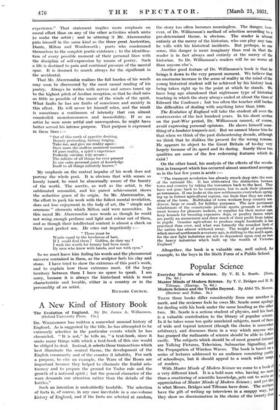A New Kind of History Book The Evolution of England.
By Dr. James A. Williamson. (Oxford University Press. 15s.) Da. WILLIAMSON has written a somewhat unusual history of England. As is suggested by the title, he has attempted to be extremely selective in the particular events which he has chronicled. " It is not," he tells us, " a text-book, since it omits many things with which a text-book of this size would be obliged to deal. Instead, it selects those transactions which best illuminate the central theme, the development of the English community and of the country it inhabits: For such a purpose, to cite an example, the Wars of the Roses are important because they helped to eliminate the feudal aris- tocracy and to prepare the ground for Tudor rule and the growth of a national spirit ; but the general character of the wars demands our attention rather than the details of the battles."
Such an intention is undoubtedly laudable. The selection of facts is, of course, in any case inevitable in a one-volume ilistory of England, and if the facts are selected at random, the story too often becomes meaningless. The danger, how- ever, of Dr. Williamson's method of selection according to a pre-determined theme, is obvious. The reader is almost entirely at the mercy of the historian, who can play any tune he wills with his historical incidents. But perhaps, in one sense, this danger is more imaginary than real in that the reader is in fact always and entirely at the mercy of the historian. So Dr. Williamson's readers will be no worse off than anyone.- else's. - Another good feature of Dr. Williamson's book is that he brings it down to the very present moment. We believe that an enormous increase in the sense of reality in the mind of the young historical student will be achieved by'his history book being taken right up to the point at which he stands. We have long ago abandoned that nightmare type of historical teaching in which the story always ended at about the time of Edward, the _Confessor ; but too often the teacher still burkes the difficulties of dealing with anything later than 1800.
The. Evolution of England will take the student all over the controversies of the last hundred years. In his short section on the post-War -period, Dr. Williamson cannot, of course, avoid expressing personal opinions. He shows himself some. thing-of a laudator temporis acti.- But we cannot blame him for that when we think of the past disheartening decade, although we. think that he dislikes the present for the wrong reasons. He appears to object to the Great Britain of to-day very largely because of its speed and its daring. Surely these two qualities are some of the few redeeming features which do exist !
On the other hand, his analysis of-the effects of the revolu- tion in transport which has occurred almost unnoticed amongst us in the last few years is acute :— " The transport revolution has already struck deep into the roots of the national life. It has obliterated the distinction between town and country by taking the townsmen back to-the land. They have not gone back to be countrymen, but to seek their pleasures as townsmen. If one looks at the new settlements everywhere spring. ing up in former agricultural regions, one finds that they are exten- sions of the town. Multitudes of town workers-keep country real- denceii, large or small, for holiday purposes. The new permanent inhabitants of the countryside provide sports grounds or refresh- ment houses for pleasure seekers, or supplies for their motor cars, keep kennels for breeding expensive dogs, or poultry farms which are partly an amusement and draw much of their profit from taking in pupils. Genuine agriculture to produce staple foodstuffs is less practised than ever; and what was formerly the soundest limb of the nation has almost withered away. The weight of population, which moved northwards a-century ago, is shifting to the south again, for the new light industries are not so dependent upon coal as were the heavy industries which built up the wealth of Victorian England."
Altogether, the book is a valuable one, well suited, for example, to the boys in the Sixth Form of a Public School.


















































 Previous page
Previous page